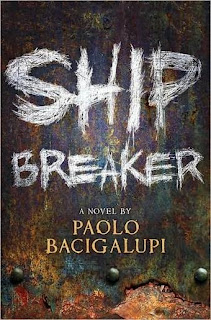
I didn't think that I was a fan of dystopian fiction because I thought it was morbid and that often dystopian fiction lacked any form of literary merit. However, it is popular now, so it is probably time that I figure out what all the kids are talking about.
I loved Ship Breaker.
Nailer lives in a futuristic world where he scavenges for copper wiring in grounded oil tankers. When he, and his crew member Pima, find a swanky clipper run aground off of the coast of Bright Sands Beach with a swank girl inside, their lives change with a few not-so-simple decisions.
The world is different. Nailer can't read and is tattooed with light crew tattoo marks. His father is addicted to drugs and beats him regularly. There is no one who can or is willing to help Nailer than Pima and her mother, Sadna.
What makes Ship Breaker have merit is the moral lessons that evolve in the story. You don't need luck just to find success; you need to me smart too. Don't judge someone by their appearance because they can be misleading. The family you are given may not be the people you love the most; you can pick your family too.
Sherman Alexie called Ship Breaker "Exciting, poetic and breathtaking." I agree with him entirely. For the last 100 pages, I couldn't stop reading. I had to know what was going to happen. Would Nailer's father be the winner in the end? Would Nailer be loyal to Lucky Girl, himself, his family, his "family," or some strange combination of those.
I would give this book to students who fell in love with books like The Hunger Games by Suzanne Collins or The Giver by Lowis Lowery. Also, I would buy this book for a middle school library, a high school library, or any library that services teens. The version I read didn't have any awards on the cover and I was very surprised by this. Upon a little research, I discovered that it won the Printz Award and was a National Book Award Finalist.
Bacigalupi, Paolo. Ship Breaker. Little, Brown & Company: New York, 2010




No comments:
Post a Comment